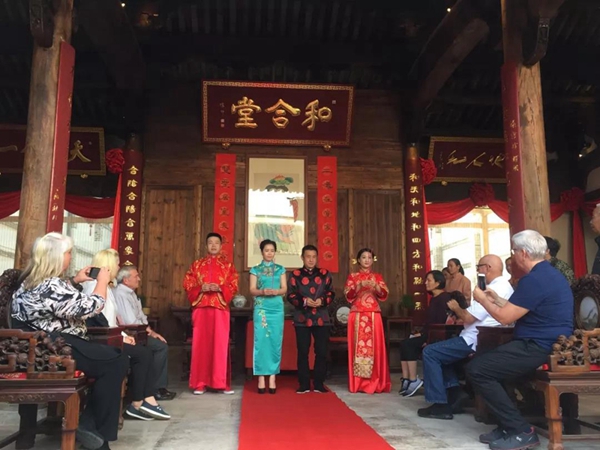Customs and etiquette in Taizhou
chinadaily.com.cn | Updated: 2019-01-15
Print Print1. Marriage
Old-fashioned marriages were usually decided and arranged by the parents. Similar to other parts of China, Taizhou's marriage procedures included the proposal, visits, engagement and setting of bride price, the wedding and visiting the bride's parents. The wedding ceremony, called "baitang" (worshiping the hall), was similar.
According to the customs in the fishing areas in Wenling, Taizhou, when the sedan with the bride arrived at the groom's house, a fire pan was put in front of her sedan, salt was thrown into it to crackle, and then the bride strode over the fire pan to keep the evil away.
In the late period of the Republic of China (1912-1949), the "civilized wedding" was adopted with the parents granting the marriage, the local gentlemen acting as chief witnesses, and bows replacing kowtow.
Since the enforcing of the law of marriage of the People's Republic of China, the bride and groom have autonomy over their marriage. They got to know each other by themselves or through matchmakers and develop their relationship without interference. Having received parental consent, they registered with the government and received the marriage certificates, along with medical check-ups. Simple weddings prevailed, with the bride walking to the groom's house accompanied by female friends, giving out sweets and cigarettes to the guests and attending a wedding banquet held at home.
The 1960s and 1970s saw no special etiquette. The bride was usually taken back to the groom's house by a group of bike riders organized by the groom, wedding banquets were held and bagged candies and red eggs were distributed. After the 1980's, weddings began to be wasteful with high bride prices, costly wedding arrangements, sedan cars and extravagant wedding banquets.
Today, betrothal gifts are still common but less and less important. Though advocated by the government, mass weddings are not popularized because of their limited number. There are also a small number of travelling weddings by public employees. Some corrupt customs such as marriage in hope of getting out of an adverse situation, child brides, concubines and leasing of wives are now rarely seen or extinct.
A wedding ceremony featuring China's Hehe culture at the Hehe Culture Park Nov 1, 2018. [Photo/WeChat account: sxtiantai]


